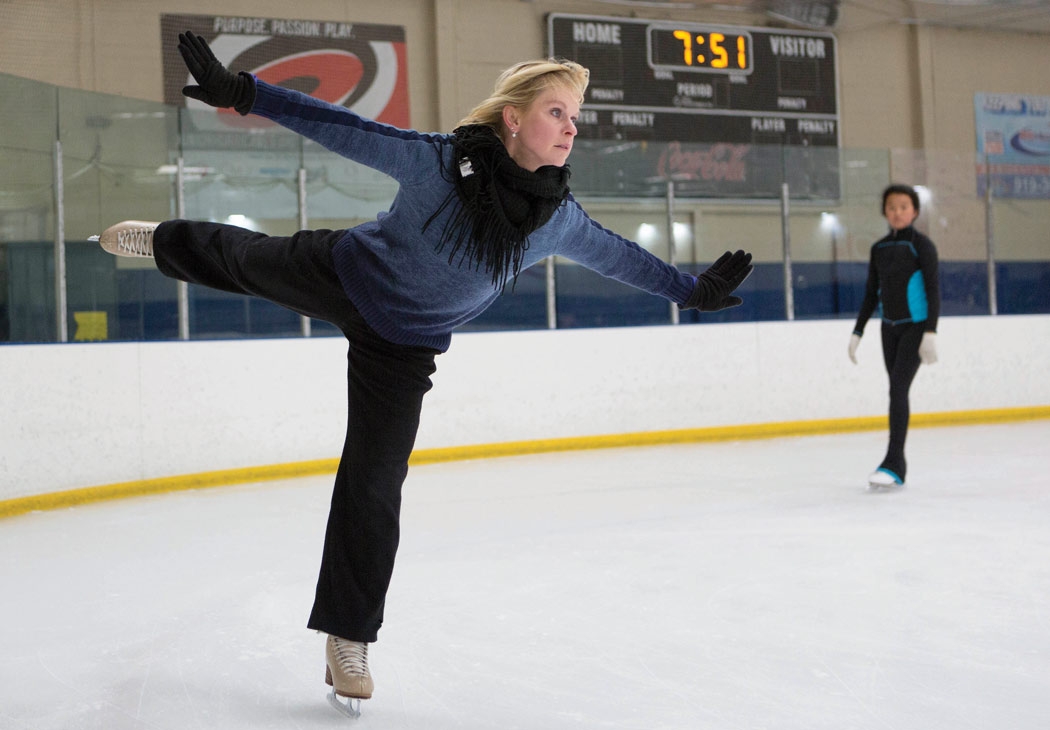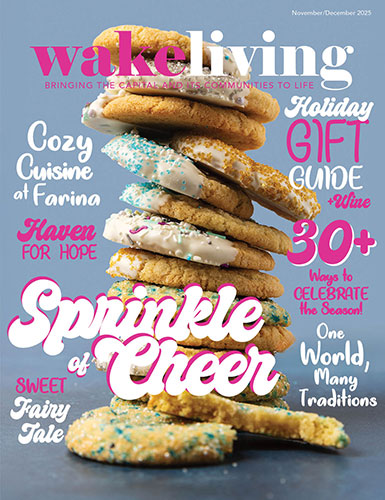Once upon a time a little girl in Russia had a dream … and it came true.
But it wasn’t quite that simple for Olympic figure skater, silver medalist and coach Elena Betchke.
“I just did it,” said Betchke, of riding the bus and subway to the rink before and after school. “The rink was an old orthodox church, with mirrors all around. I was age 5, 6.
“When I was 7 they built a new facility. I tried out at the open house and was chosen. Once you were picked for the (Russian Skating Federation’s) junior or senior team, your training expenses were covered. Then the expectations came in.”
By age 14 Betchke was fully committed to skating, after a period of “lollygagging” that got her dismissed from training at 12. She begged her way back onto the team, and became a pairs skater.
Olympic silver medalist in figure skating Elena Betchke, with her student Jasmine Ye, says “It’s OK to hear, ‘this is not working.’ Step back, look at what you could do better, and get back to work.”
“Without a goal you are in limbo. That break was just missed time. I could have mastered triple jumps sooner, if I would have trusted my coach 100 percent and not allowed myself unnecessary drama,” she said. “Negative thoughts interrupt self-confidence, and separate you from your goal. If I hadn’t done that, my medal would be gold.”
Betchke has earned top international honors multiple times on the ice, with partners including Denis Petrov. Known for inventive moves such as the “impossible death spiral,” the two earned Olympic silver in 1992, just after the 1991 collapse of the Soviet Union. They took the podium as part of the Unified Team, minus the flag and anthem of their native land.
Betchke skated professionally with Stars on Ice from 1993 to 2000, alongside notables such as Kristi Yamaguchi, and officially moved to the U.S. in 1996.
Today, Betchke lives in Garner with her children, Alex and Sophia, and her mother. She coaches more than 20 figure skaters at Polar Ice House locations in Cary and Garner, from ages 5 to 40-plus.
“Self-discipline is a big factor; the mental work is the toughest,” she said of her artistic sport, and her life. “At any age the D word — desire — has to be there.
“Once you say, ‘I want this,’ commit. That’s true in everything. Even now, I go to bed early, exercise — structure life around my commitment. It’s my lifestyle.”
Life on the ice and in front of judges has taught Betchke a few things about handling pressure.
“It’s OK to hear, ‘this is not working.’ Step back, look at what you could do better, and get back to work. At bedtime I write down my mistakes, to learn, and save big decisions for when I’m fresh. Tomorrow is a new day. I forgive myself and move on.”
Whether you win or lose in life, Betchke says, practice good sportsmanship.
“Be kind and respectful, no matter what others do,” she said. “I teach my children to be positive, and care about what they represent.”
She emphasizes that while striving to be the best is a worthy goal, perfection isn’t.
“Perfect doesn’t exist,” Betchke said, “but adaptability is important on a daily basis. I can adjust my behavior but never my fundamental beliefs. Respect, trust and commitment, I will never compromise.”
The deep end
While Betchke’s competitive days are behind her, Ashley Twichell is in deep — water, that is.
In April Twichell beat out six world champions to win the USA Swimming National Open Water Championship, on the final stroke. And in May, she won the 1,500-meter freestyle in the Arena Pro Swim Series.
Ashley Twichell at the Open Water National Championship April 8 in Miromar Lakes, Fla./Photos by Mike Lewis/Ola Vista Photography
Now, after tough Olympic trials in late June, Twichell, 27, is setting aside her Olympic dream yet again, after placing fifth in the women’s 800-meter freestyle finals. There were just two spots open on the Olympic team.
Twichell has missed out on the Olympic Games before, also by the tiniest of margins. And in 2015, she was sidelined by a frustrating rotator cuff surgery that kept her out of the water for eight weeks.
“It’s all forced me to keep things in perspective,” she said. “How lucky am I to compete, and to travel to six continents and countless countries? My medals are prized possessions of course, but more important are the friendships and memories created.”
A competitive swimmer since age 6, Twichell broke multiple school records in the pool at Duke University before graduating in 2011 as an NCAA All-American.
“But senior year, I knew I wasn’t ready to be done. I happened to be invited to an open water camp that started that June,” said Twichell, who trains in Cary with Raz Cuparencu, the former head coach of the Triangle Aquatic Center Titans.
Ashley Twichell took the 10-kilometer national title in April at the USA Swimming Open Water National Championships. She won with a time of 2 hours, 1 minute, 51.78 seconds.
“Looking back, it was a huge risk, moving across the country to California. It was tough; we swam 60 miles a week, spent five hours a day in the water. But at the conclusion of camp were the open water nationals. I came in third, and that qualified me for my first internationals,” she said.
The win took Twichell to the 2011 FINA World Championships in Shanghai, China, where her team took gold and she was “shocked” to earn an individual bronze.
That bronze medal changed the course of her swimming career, into the unpredictable arena of open water swimming, which had become an Olympic event in 2008.
“In the pool you have one lane, lane lines and walls. I swim in lakes and rivers, with different temperatures, tides and currents,” Twichell said. “You can only control what you do. You have to adapt, such as when someone tries to break away.
Ashley Twichell
“It’s forced me to not get so hung up on what I have planned. Our coaches say not to waste mental energy stressing. Conserve that energy and use it to deal with what’s thrown at you.”
That’s good advice for life, too.
“I enjoy the challenge, and love the feeling during and after a tough practice. For me, the mental pressures are tougher than the physical,” Twichell said. “It’s about staying positive, and not doubting yourself.”
And when it comes to competing alongside the best in the world?
“If you dream big and have lofty goals, the reward can be fantastic but the risk is not fun,” Twichell said. “But I’d regret not having these goals. Even not achieving them outweighs the what-if questions.
“I put in all the work, day in and day out,” she said. “If I can say I’ve done everything I possibly could, then no matter what happens, it’s still a success.”






